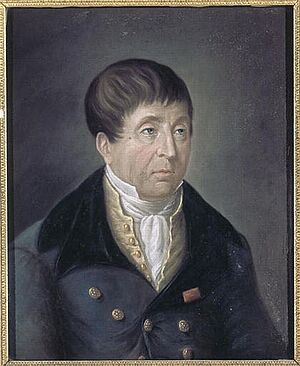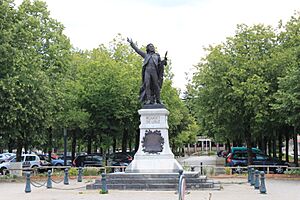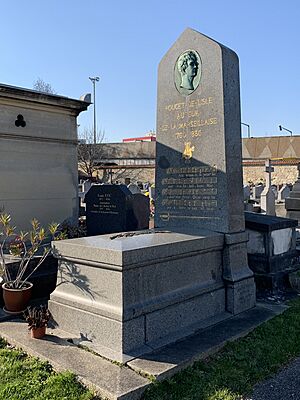Claude Joseph Rouget de Lisle facts for kids
Quick facts for kids
Claude Joseph Rouget de Lisle
|
|
|---|---|

Rouget de Lisle in 1835
|
|
| Born | 10 May 1760 Lons-le-Saunier, France |
| Died | June 26, 1836 (aged 76) Choisy-le-Roi, Seine-et-Oise, France |
| Allegiance | France |
| Service/ |
French Army |
| Years of service | 1784–1793 |
| Rank | Captain |
| Awards | Chevalier. Legion of Honour (1831) |
| Other work | Chant de guerre pour l'armée du Rhin, "La Marseillaise" |
Claude Joseph Rouget de Lisle (born May 10, 1760 – died June 26, 1836) was a French army officer. He is famous for writing the words and music of a song in 1792. This song was first called Chant de guerre pour l'armée du Rhin. It later became known as La Marseillaise. Today, it is the national anthem of France.
Contents
Early Life of Rouget de Lisle
Rouget de Lisle was born in Lons-le-Saunier, a town in France. His parents lived in a nearby village. A special plaque marks his birthplace. There is also a statue of him in the town center. He was the oldest child of Claude Ignace Rouget and Jeanne Madeleine Gaillande.
In 1784, he joined a group called "Les Frères discrets." This happened after he became an army officer.
Military Career and Challenges
Rouget de Lisle joined the army as an engineer. He rose to the rank of captain. He was loyal to the king, like his father. Because of this, he did not agree with the new government's rules.
In 1793, he was removed from the army and put in prison. He was in danger but was set free later. After this, he left the army and moved to Montague.
The Story of La Marseillaise

The song that made him famous, "La Marseillaise," was written in Strasbourg. Rouget de Lisle was stationed there in April 1792. France had just started a war with Austria.
The mayor of Strasbourg, Philippe-Frédéric de Dietrich, held a dinner. He told the officers that France needed a national song. Rouget de Lisle felt very patriotic. He went back to his room and wrote the words and music.
The song was first called "War Song for the Army of the Rhine." It got the name Marseillaise later. This happened when volunteers from Provence sang it. They marched into Paris and helped storm the Tuileries Palace on August 10, 1792.
After the war, Rouget de Lisle wrote other songs. In 1825, he published a book called Chants français. It had fifty poems set to music. He also wrote Essays in Verse and Prose in 1797. This book included the Marseillaise and other writings.
He returned to public life after a big change in government. King Louis Philippe I gave him the Legion of Honour award in 1831. This was a very important award.
Later Life and Legacy

Rouget de Lisle died in Choisy-le-Roi, Val de Marne. He did not have much money when he died.
His body was later moved to the Invalides on July 14, 1915. This happened during World War I. The Invalides is a famous place in Paris where many French military heroes are buried.
See also
 In Spanish: Claude Joseph Rouget de Lisle para niños
In Spanish: Claude Joseph Rouget de Lisle para niños
 | Janet Taylor Pickett |
 | Synthia Saint James |
 | Howardena Pindell |
 | Faith Ringgold |


